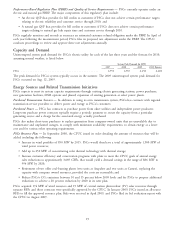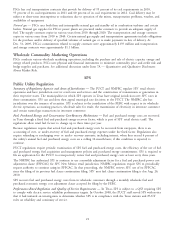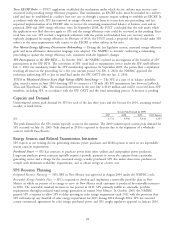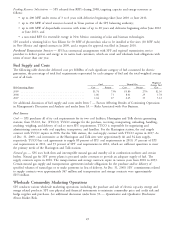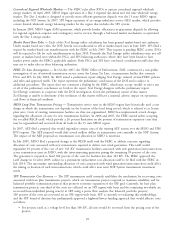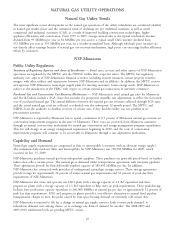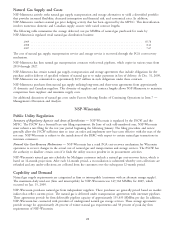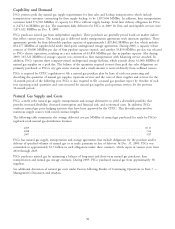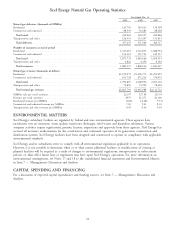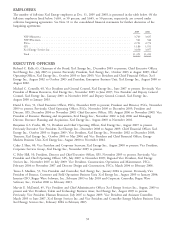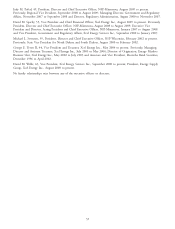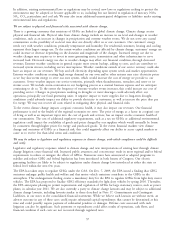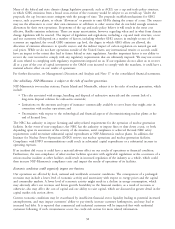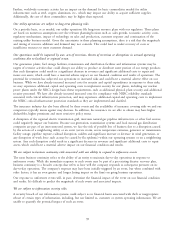Xcel Energy 2009 Annual Report Download - page 39
Download and view the complete annual report
Please find page 39 of the 2009 Xcel Energy annual report below. You can navigate through the pages in the report by either clicking on the pages listed below, or by using the keyword search tool below to find specific information within the annual report.NSP-Wisconsin also owns and operates one LNG plant with a storage capacity of 270,000 Mcf equivalent and one
propane-air plant with a storage capacity of 2,700 Mcf equivalent to help meet its peak requirements. These
peak-shaving facilities have production capacity equivalent to 18,408 MMBtu of natural gas per day, or approximately
13 percent of peak day firm requirements. LNG and propane-air plants provide a cost-effective alternative to annual
fixed pipeline transportation charges to meet the peaks caused by firm space heating demand on extremely cold winter
days.
NSP-Wisconsin is required to file a natural gas supply plan with the PSCW annually to change natural gas supply
contract levels to meet peak demand. NSP-Wisconsin’s winter 2009-2010 supply plan was approved by the PSCW in
October 2009.
Natural Gas Supply and Costs
NSP-Wisconsin actively seeks natural gas supply, transportation and storage alternatives to yield a diversified portfolio
that provides increased flexibility, decreased interruption and financial risk, and economical rates. In addition,
NSP-Wisconsin conducts natural gas price hedging activity that has been approved by the PSCW. This diversification
involves numerous domestic and Canadian supply sources with varied contract lengths.
The following table summarizes the average delivered cost per MMBtu of natural gas purchased for resale by
NSP-Wisconsin’s regulated retail natural gas distribution business:
2009 .................................................................. $5.85
2008 .................................................................. 8.54
2007 .................................................................. 7.56
The cost of natural gas supply, transportation service and storage service is recovered through various cost-recovery
adjustment mechanisms. NSP-Wisconsin has firm natural gas transportation contracts with several pipelines, which
expire in various years from 2010 through 2029.
NSP-Wisconsin has certain natural gas supply, transportation and storage agreements that include obligations for the
purchase and/or delivery of specified volumes of natural gas or to make payments in lieu of delivery. At Dec. 31, 2009,
NSP-Wisconsin was committed to approximately $126 million in such obligations under these contracts.
NSP-Wisconsin purchased firm natural gas supply utilizing short-term agreements from approximately 13 domestic
suppliers Canadian suppliers. This diversity of suppliers and contract lengths allows NSP-Wisconsin to maintain
competition from suppliers and minimize supply costs.
See additional discussion of natural gas costs under Factors Affecting Results of Continuing Operations in Item 7 —
Management’s Discussion and Analysis.
PSCo
Public Utility Regulation
Summary of Regulatory Agencies and Areas of Jurisdiction — PSCo is regulated by the CPUC with respect to its
facilities, rates, accounts, services and issuance of securities. PSCo holds a FERC certificate that allows it to transport
natural gas in interstate commerce without PSCo becoming subject to full FERC jurisdiction under the federal Natural
Gas Act. PSCo is also subject to the jurisdiction of the FERC with respect to certain natural gas transactions in
interstate commerce.
Purchased Gas and Conservation Cost-Recovery Mechanisms — PSCo has two retail adjustment clauses that recover
purchased gas and other resource costs:
•GCA — The GCA mechanism allows PSCo to recover its actual costs of purchased gas and transportation to
meet the requirements of its customers. The GCA is revised quarterly to allow for changes in gas rates.
•DSMCA — PSCo has a low-income energy assistance program. The costs of this energy conservation and
weatherization program are recovered through the gas DSMCA.
Performance-Based Regulation and Quality of Service Requirements — The CPUC established a combined electric and
natural gas QSP. See further discussion under Item 1 — Electric Utility Operations.
29


